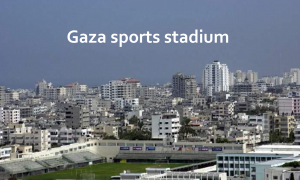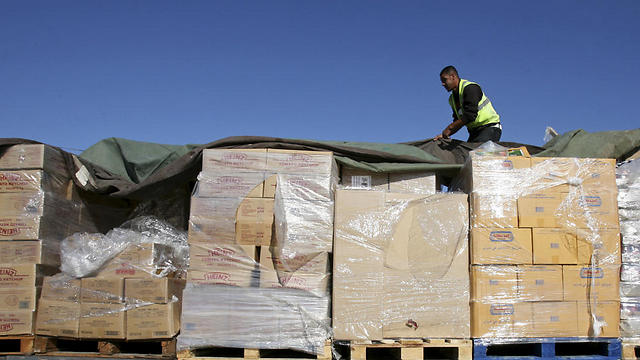
Facing continuous financial troubles and ignoring the disapproval of the Palestinian Authority, the Hamas terrorist group offers a solution to compensate loyal employees who are owed months in back pay.
By The Associated Press
Hamas has begun handing out plots of the land to 40,000 civil servants loyal to the Islamic militant group, to make up for millions of dollars in salaries it owes them for the past two years. The land giveaway is the latest sign that Hamas is struggling financially after almost a decade of uncontested power in the coastal strip.

Building materials in Gaza – Photo: AP
Gazans grumble about a lack of jobs, constant electricity shortages and a blockade imposed by Israel and Egypt that has confined the territory’s 1.8 million people to the tiny strip. The World Bank has rated Gazan unemployment at 38 percent.
Since 2014, Hamas’ main problem has been a dire lack of cash amid Egypt’s clampdown on smuggling tunnels underneath Gaza’s border with Egypt’s Sinai Peninsula. Before the tunnels closed, Hamas received millions of dollars from taxes on smuggled consumer goods, including subsidized Egyptian fuel.
Earlier this week, earth-moving equipment dug into a high hill near Khan Younis, scooping out sand and loading it into trucks at the site designated for the Al-Isra 2 housing project. The new land giveaway allows each group of four Hamas employees to share a 500-square-meter plot that they can either build on or sell. Even the sand collected on the land can be sold for about $100 a truckload. About 13,000 civil servants have already signed up for certificates attesting to their ownership of the plots. Bulldozers are working to get three initial projects launched in August.
RELATED:
- Fatah: 1,700 Hamas Millionaires in Gaza from ‘taxing’ aid
- Hamas to pay officials’ salaries with evacuated Jewish settlement land
- Arab League: ‘Hamas-Fatah belligerency hinders efforts to rebuild Gaza’
Most of the land was once a part of Jewish settlements in southern Gaza, near the towns of Rafah and Khan Younis. The settlements were demolished when Israel pulled settlers and soldiers from the coastal strip in 2005.
Riham Khalil, one of the civil servants, said Hamas owes her 64,000 shekels (about $17,000) in back salaries. Last month, she and three of her colleagues were allocated a 500-square-meter plot in Al-Isra 2. “We had to accept it on a ‘bird in the hand’ basis because there was no cash,” she said. “I wish I could find someone to buy the land and get the money.”
Senior Hamas official Salah al-Bardawil said the land giveaway is a temporary fix and “not yet a strategic one,” which would solve the group’s financial problems for good.After West Bank-based Fatah leader and Palestinian President Mahmoud Abbas lost Gaza in 2007 following the Hamas’ takeover, he agreed to form a unity government with Hamas for both Gaza and the West Bank as an attempt to heal the split. The deal stalled, though, in part because Abbas refused to add the 40,000 employees hired by Hamas since 2007 to the payroll of his Palestinian Authority. In time, Hamas resorted to paying its loyalists 40 percent of their salaries at 50 day intervals.
If Abbas had put Hamas employees on his payroll, he would have likely encountered major problems with donor governments, including the United States, suspicious of money ending up in the pockets of Hamas, which much of the West considers a terrorist group.
The West Bank-based Palestinian Authority has voiced its criticism of the land-for-money program. “No one has the authority to issue decisions to privatize government-owned land in the public interest, except for President Abbas,” said PA spokesman Jamal Dajani. He dismissed Hamas’ claims that Abbas has neglected Gaza, as the Palestinian Authority still pays the monthly salaries of some 70,000 civil servants in Gaza who are loyal to Abbas and left their posts after the Hamas takeover.
Gazans presently live with rolling power cuts of 12 to 18 hours a day and the strip’s water is polluted and undrinkable. The Gulf Arab state of Qatar has bailed out Hamas in the past and recently announced it was giving about $30 million to help pay a full month’s salary to all Hamas employees in Gaza. In October 2014, Qatar sent cash to half of Hamas’ public employees, excluding the security forces.
Hamas has been spending some of its new revenue to fund summer camps, where children are exposed to its militant anti-Israeli ideology, or for large communal evening meals known as iftars during the Muslim holy month of Ramadan.
After an Israeli-Turkish reconciliation deal in early July, Turkey sent an aid ship to Gaza through an Israeli port and a delegation that met separately with Israeli, Palestinian and Hamas officials to explore Gaza’s energy crisis and outline possible solutions.
Mkhaimar Abusada, a political scientist at Gaza’s Al-Azhar University, said that attention should now be given to how the average Palestinian reacts to the move and reported plans for improvement. “Time will tell if these promises are enough to convince the Palestinian citizen to keep silent over his living conditions.”
View original Ynet publication at:
http://www.ynetnews.com/articles/0,7340,L-4834889,00.html







 Israeli New Shekel Exchange Rate
Israeli New Shekel Exchange Rate